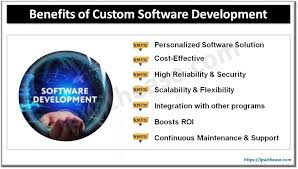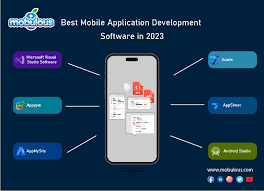Custom software application development is the process of creating software that is tailored specifically to meet the unique needs of a business or organization. This type of software development involves creating applications that are designed to work seamlessly with existing systems and processes, while also providing a high level of functionality and performance.
One of the main benefits of custom software application development is that it can help businesses to streamline their operations and improve efficiency. By creating software that is specifically designed for their needs, businesses can eliminate the need for manual processes and reduce the risk of errors or data loss.
Another benefit of custom software application development is that it can help businesses to stay competitive in their industry. By creating unique applications that are not available off-the-shelf, businesses can differentiate themselves from their competitors and offer a more personalized experience to their customers.
However, custom software application development does come with its own challenges. It requires a significant investment in terms of time, resources, and expertise. Businesses must be willing to commit to the process and work closely with developers to ensure that the final product meets their needs.
When considering custom software application development, it’s important for businesses to choose a reputable developer who has experience in their industry. The developer should have a proven track record of delivering high-quality products on time and within budget.
In conclusion, custom software application development can be an excellent way for businesses to improve efficiency, stay competitive, and provide a more personalized experience for their customers. While it does require an investment in time and resources, the benefits can be significant for those who are willing to commit to the process.
Answers to 8 Common Questions About Custom Software Application Development
- What is custom software application development?
- What are the benefits of custom software application development?
- How much does it cost to develop a custom software application?
- What types of technologies are used in custom software application development?
- How long does it take to develop a custom software application?
- How can I ensure my custom software project is successful?
- Are there any risks associated with developing a custom software application?
- What support and maintenance services do you offer for custom software applications?
What is custom software application development?
Custom software application development is the process of creating software that is specifically designed and tailored to meet the unique needs of a particular business or organization. This type of software development involves creating applications that are customized to work seamlessly with existing systems and processes, while also providing a high level of functionality and performance.
Unlike off-the-shelf software, which is designed to meet the needs of a broad range of users, custom software application development is focused on meeting the specific needs of a single business or organization. This means that the software can be designed to address specific challenges or opportunities that are unique to that business.
Custom software application development typically involves working closely with developers to identify the requirements for the software, designing and developing the application, testing it thoroughly, and deploying it in a way that minimizes disruption to existing systems and processes.
While custom software application development can be more expensive than using off-the-shelf solutions, it offers several advantages. For example, custom software can be tailored precisely to meet an organization’s needs, making it more efficient and effective than generic solutions. Additionally, custom software can be designed to integrate seamlessly with other systems and processes within an organization, which can save time and improve productivity.
Overall, custom software application development is an important tool for businesses looking to gain a competitive advantage by leveraging technology in innovative ways. By working closely with experienced developers who understand their unique needs and challenges, businesses can create powerful applications that help them achieve their goals more effectively.
What are the benefits of custom software application development?
There are several benefits of custom software application development, including:
- Tailored to specific business needs: Custom software is designed to meet the unique needs of a business or organization. This means that it can be tailored to fit specific workflows, processes, and requirements.
- Increased efficiency: Custom software can help businesses streamline their operations by automating manual processes and eliminating the need for multiple systems or applications.
- Improved performance: Custom software is designed to work seamlessly with existing systems and processes, which can improve overall performance and reduce the risk of errors or data loss.
- Competitive advantage: By creating unique applications that are not available off-the-shelf, businesses can differentiate themselves from their competitors and offer a more personalized experience to their customers.
- Cost-effective in the long run: While custom software development may require an initial investment in time and resources, it can be cost-effective in the long run by reducing operational costs and increasing productivity.
- Scalability: Custom software can be designed with scalability in mind, allowing businesses to easily add new features or functionality as their needs change over time.
In summary, custom software application development offers several benefits for businesses looking to improve efficiency, performance, and competitiveness. It provides tailored solutions that meet specific needs while also offering long-term cost savings and scalability.
How much does it cost to develop a custom software application?
The cost of developing a custom software application can vary greatly depending on a number of factors, including the complexity of the application, the technologies used, the development team’s location and experience, and the time required to complete the project.
In general, custom software development is a significant investment that requires careful planning and budgeting. The cost can range from tens of thousands to hundreds of thousands or even millions of dollars for large-scale enterprise applications.
It’s important to note that while custom software development may seem expensive upfront, it can often save businesses money in the long run by improving efficiency and reducing errors. Additionally, businesses may be able to recoup their investment through increased revenue or cost savings.
To get an accurate estimate for your specific project, it’s best to consult with a reputable software development company. They can provide you with a detailed proposal that outlines the scope of work, timeline, and estimated costs based on your unique requirements. It’s important to choose a company that has experience in your industry and has a proven track record of delivering high-quality products on time and within budget.
What types of technologies are used in custom software application development?
Custom software application development involves the use of a wide range of technologies, tools, and programming languages. The specific technologies used will depend on the requirements of the project and the preferences of the development team. Some common technologies used in custom software application development include:
- Programming languages: Custom software applications can be developed using a variety of programming languages such as Java, Python, C++, Ruby, and PHP.
- Databases: Custom software applications typically require a database to store and manage data. Popular database management systems include MySQL, Oracle, Microsoft SQL Server, and PostgreSQL.
- Frameworks: Frameworks provide a set of tools and libraries that developers can use to build custom software applications more efficiently. Popular frameworks for web application development include Ruby on Rails, Django (Python), Laravel (PHP), and Spring (Java).
- APIs: Application Programming Interfaces (APIs) allow custom software applications to interact with other systems or services. APIs can be used to integrate with third-party services like payment gateways or social media platforms.
- Cloud computing: Cloud computing platforms like Amazon Web Services (AWS), Microsoft Azure, and Google Cloud Platform provide infrastructure services that enable developers to deploy custom software applications in a scalable and cost-effective manner.
- DevOps tools: DevOps tools like Docker, Kubernetes, Jenkins, and Git are used to automate the process of building, testing, deploying, and managing custom software applications.
In summary, custom software application development involves the use of a wide range of technologies that are tailored specifically to meet the unique needs of each project. Developers must have expertise in these technologies in order to create high-quality custom software applications that meet their clients’ requirements.
How long does it take to develop a custom software application?
The time it takes to develop a custom software application can vary greatly depending on the scope and complexity of the project. Some applications may take only a few weeks to develop, while others may take several months or even years.
The development process typically involves several stages, including requirements gathering, design, development, testing, and deployment. Each stage can take varying amounts of time depending on the specifics of the project.
Factors that can impact the development timeline include the size and complexity of the application, the number of features and functionalities required, the level of customization needed, and the availability of resources such as developers and testers.
It’s important for businesses to work closely with their development team to establish realistic timelines for each stage of the process. This will help ensure that expectations are managed appropriately and that deadlines are met.
In general, businesses should expect custom software application development projects to take anywhere from several weeks to several months or more depending on their specific needs. It’s important to prioritize quality over speed in order to ensure that the final product meets all requirements and functions as intended.
How can I ensure my custom software project is successful?
Ensuring the success of a custom software project involves careful planning, communication, and collaboration between the development team and the business or organization. Here are some tips to help you ensure the success of your custom software project:
- Define your goals: Before starting a custom software project, define your goals and objectives. What do you want to achieve with this software? What problems are you trying to solve? By defining your goals upfront, you can ensure that the development team is aligned with your vision.
- Choose the right development team: Choose a reputable development team with experience in your industry. Look for developers who have a proven track record of delivering high-quality products on time and within budget.
- Communicate clearly: Communication is key to ensuring the success of a custom software project. Work closely with the development team to ensure that they understand your requirements and expectations. Provide regular feedback throughout the development process to ensure that the final product meets your needs.
- Test early and often: Testing is an essential part of any software development project. Test early and often to identify any issues or bugs before they become major problems.
- Manage scope creep: Scope creep is when new features or requirements are added to the project after it has already started, which can lead to delays and increased costs. To manage scope creep, define clear boundaries for what is included in the project and stick to them.
- Plan for maintenance: Custom software requires ongoing maintenance and updates to ensure that it continues to meet your needs over time. Plan for ongoing maintenance from the outset to ensure that your investment continues to provide value in the long term.
By following these tips, you can help ensure that your custom software project is successful and delivers value to your business or organization over time.
Are there any risks associated with developing a custom software application?
Yes, there are some risks associated with developing a custom software application. Here are some of the most common risks:
- Cost overruns: Custom software development can be expensive, and there is always a risk that the project will go over budget. This can happen if the requirements change during development or if unexpected issues arise.
- Delayed timelines: Custom software development can take longer than expected, especially if there are unforeseen challenges or complications that arise during the process.
- Compatibility issues: Custom software applications need to work seamlessly with existing systems and processes. If compatibility issues arise, it can cause delays and additional costs.
- Security vulnerabilities: Custom software applications need to be secure to protect sensitive data and information. If security vulnerabilities are not addressed during development, it can lead to data breaches and other security issues.
- User adoption: If the custom software application is not user-friendly or does not meet the needs of end-users, it may not be adopted by employees or customers.
To mitigate these risks, businesses should work closely with their developers to establish clear requirements and timelines for the project. It’s also important to conduct regular testing throughout the development process to identify any issues early on. Finally, businesses should ensure that their developers have experience in their industry and a proven track record of delivering high-quality products on time and within budget.
What support and maintenance services do you offer for custom software applications?
We offer a range of support and maintenance services for custom software applications, including:
• 24/7 technical support and issue resolution
• Regular software updates and bug fixes
• Scheduled maintenance to ensure optimal performance
• Security patching and vulnerability assessments
• Training and user documentation
• Customized reporting and analytics




